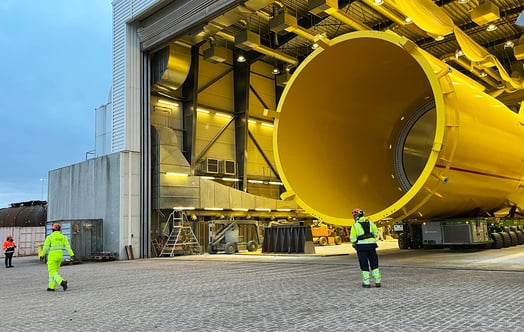Martijn Hagens: “Energy policy is industrial policy”
Europe currently faces a catch-22 situation that threatens to stall its progress for fossil freedom. Martijn Hagens, Head of Markets, explains the situation and points to needed solutions.

Matijn Hagens, Senior Vice President and Head of Business Area Markets at Vattenfall.
“In Europe’s deck of cards, the energy transition is the wild card: A crucial opportunity for European industry to secure a competitive position on the global stage. But playing it right requires confidence and a clear rulebook. All players, the industry, the energy sector and policymakers, must deliver and play the cards right moving forward.
Europe currently faces a catch-22 that threatens to stall its progress. Without clear demand signals from the industry, the energy sector hesitates to make large-scale fossil-free investments. At the same time, industries are reluctant to commit without guaranteed access to a stable, affordable fossil-free energy supply.
So, in the end, there is no business case for fossil-free projects. Without projects, the energy transition risks stalling. And stalling is costly, not just financially, but also in lost momentum for Europe's innovation and competitiveness.
This deadlock where no player dares to make a move undermines Europe’s net-zero goals and with it its competitiveness. The case for stronger collaboration between the energy sector and industry is key to ensuring we meet our climate targets. Because energy policy is industry policy.
We have proven through Vattenfall’s collaborations with key industry players — such as BASF for our offshore wind farm in the Netherlands, SSAB and LKAB through our HYBRIT partnership in Sweden, or our electricity partnerships with Evonik, Salzgitter, LyondellBasell, PASM Deutsche Telekom and Wieland in Germany — that these partnerships between the energy sector and industry unlock the investment dilemma and allow us to keep the pace we need to reach our climate targets in the EU.
Some of these energy-industry partnerships are based on Power Purchase Agreements (PPAs), long-term energy supply contracts that combine competitive pricing with the certainty that the electricity comes from fossil-free sources. For power suppliers, they provide predictable revenue streams, de-risk investments in new fossil-free capacity, and help scale up projects. For industrial offtakers, PPAs offer long-term price stability, hedge against market volatility, and support sustainability targets by securing access to fossil-free electricity. PPAs also ensure that supply and demand of electricity are developing in the same pace, ensuring a healthier market environment both for new and existing generation assets.
High upfront capital investments related to electrifying industrial processes or industrial competitiveness concerns can be a hurdle to progress electrification further. In these cases, targeted financial support to overcome transitional cost barriers can support industrial players in their decarbonisation journey and make PPAs accessible to them. Additionally, signing PPAs is often difficult for new market entrants and smaller companies in energy-intensive sectors such as refineries, steel, or cement. Start-ups, scale ups and SMEs initially lack the financial strength or credit rating required to enter into PPAs, despite being critical for Europe’s competitiveness.
Credit guarantees in these cases can play an instrumental role to unlock to PPA market. Without support and risk mitigation, many industrial actors will be unable to participate in the energy transition, putting Europe’s climate and economic goals at risk.
Equally, the transparent implementation of existing climate and energy policies is key to create the conditions for a market where PPAs can be signed in first place. Competitiveness initiatives under the Clean Industrial Deal must be fully embedded in the Green Deal. Let’s not reopen what’s been agreed on, let’s bring it to life.
We must recognize that going green is not just about ecology, it’s about economics. A fossil-free energy system is the only viable path to affordable, secure, and competitive energy for European industry. Visibility on targets, such as a 90% greenhouse gas emission reduction target by 2040, creates trust for investors and industries to sign PPAs in first place by providing long term policy certainty. This certainty is critical to allow demand and supply to grow at the same pace and thereby enable a competitive future for Europe.
Europe has the industry, the technology, the developers, and most importantly, the innovative minds to lead the way in the energy transition. We already have the technical solutions in place. What we need now is the regulatory stability to give the industry and the energy sector the confidence to make their next move. The opportunity is here, and it’s time to play the cards right.”
Text:
Martijn Hagens, Head of BA Markets



